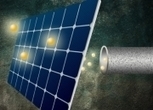New technique developed at MIT could enable a major boost in solar-cell efficiency.
A special coating could dramatically improve the percentage of energy that can be harvested from solar cells by splitting photons in two, new research suggests. For every photon (or particle of light) that hits a solar cell, the coating — called pentacene — doubles the number of electrons, and energy, that can be harvested, at least with high-energy blue or green wavelengths of light.
A new technique to produce solar cells might one day yield devices that boast significantly greater efficiency — long a holy grail in the development of commercial solar panels.
Researchers at MIT say they've successfully harnessed an obscure technique, called "singlet exciton fission," that would reduce the amount of sunlight wasted as heat instead of being converted to electricity. In a typical solar cell, each photon of sunlight hitting the cell knocks loose one electron, to kickstart the process of energy conversion. In this new research, however, each photon knocks two electrons loose — making the process of solar energy generation more efficient.
The process behind the research is relatively simple: researchers successfully coated solar cells with pentacene, an organic compound capable of generating two electrons from one photon.
Via trendspotter



 Your new post is loading...
Your new post is loading...








http://www.theverge.com/2013/4/19/4243028/solar-cell-efficiency-mit
http://www.livescience.com/28845-solar-cell-improves-efficiency.html